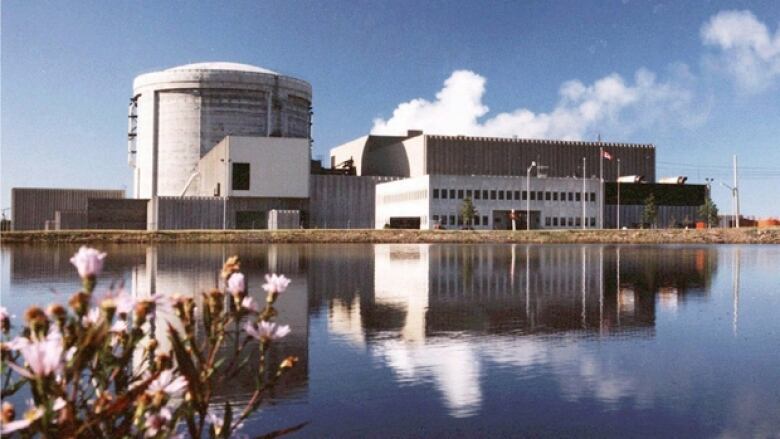Turning seawater into electricity: NB Power's untested idea for Belledune
Utility with uneven record on innovation puts $7M into researching seawater's potential

NB Power is betting $7 million on a promising but untested new way to generate electricity without emitting greenhouse gases: turning seawater from the Bay of Chaleur into energy.
CEO Gatan Thomas talked last month about converting the Belledune generating station to hydrogen power by 2030, after coal is phased out.
But the public utility is tight-lipped so far on its collaboration with Florida-based Joi Scientific, a start-up headquartered at the Kennedy Space Centre.
"Unfortunately, it is too early in the process to be discussing details of this research and development project," said NB Power spokesperson Marie-Andre Bolduc.
Joi Scientific's vice-president of marketing, Vicky Harris, said in an email statement that the company is "involved in multiple research projects, in many different sectors, but, as I am sure you would understand, we are not sharing details of our proprietary research and development work at this time."
On its website, the company calls hydrogen "the universe's most abundant element and the world's cleanest source of energy."
Once considered too difficult

Extracting hydrogen from water and storing and transmitting it has been considered too difficult and too expensive, but Joi Scientific says in a promotional video that it "has solved the problems that have kept hydrogen from being widely used for energy."
The company says on its site that its "hydrogen 2.0" process is "a very efficient extraction technology that will enable the localized production of hydrogen gas from water safely, affordably and with no carbon emissions."
The $7 million is paying for further research into how Joi's technology would apply at NB Power's Belledune generating station, which sits less than 200 metres from the Bay of Chaleur on New Brunswick's north shore.
Thomas said last month that converting Belledune could cost "hundreds of millions" of dollars, but the eventual fuel supply would be a bargain.
"What's cheaper fuel than seawater?" he said. "There's plenty of it in New Brunswick."
The CEO even suggested a hydrogen-powered Belledune plant could lead to lower power rates for NB Power customers.
He called hydrogen "a very promising new fuel" but acknowledged the technology is still in the research and development phase. But he pointed out NB Power has 12 years to come up with a replacement fuel for Belledune.
What to do with Belledune?

The federal government has set 2030 as the deadline for provinces to phase out coal-powered electricity under its national climate plan.
NB Power says other options for Belledune include burning natural gas or biomass. But those options would still generate some carbon dioxide emissions.
Green Party Leader David Coon said last month that it was "news to me" that hydrogen power could be generated affordably enough to use in a power plant.
University of New Brunswick chemical engineering professor Willy Cook says turning hydrogen into energy is simple, but it's not necessarily cost-effective because the process itself requires a lot of electricity.
"You can't get something for nothing," he said. "Using electricity to produce hydrogen to go back to the process to produce electricity--that in itself probably isn't economically viable."
But he said he's not familiar with Joi Scientific's technology and it's possible the company has come up with "a more efficient process."
He also said if NB Power earned carbon credits for reducing emissions, hydrogen technology might become competitive with other energy sources.
"I have faith in the NB Power engineers to come through and do that assessment properly," he said.
Some costly efforts

Thomas claimed in December there is "a solid history at NB Power of being leaders in many areas," including the first Candu 6 nuclear generating station at Point Lepreau and the first-of-its-kind high-voltage direct-current converter station in Eel River.
But some of the utility's forays into new technologies have been costly.
NB Power spent $700 million refurbishing its Coleson Cove station to burn Orimulsion, only to see its supply agreement with a Venezuelan state-owned fuel company fall apart. The utility's lawsuit was eventually settled for $338 million.
And the refurbishment of Point Lepreau, the first upgrade of its kind, went $1 billion over budget and was three years late.
New Brunswick governments invested $4.7 million in a Saint John company, Atlantic Hydrogen, that went bankrupt in 2015. The company was trying to develop clean-energy technology but wasn't able to make it commercially viable.
Minister favours 'new direction'
Still, investors in the U.S., including Dean Woodman, a wealthy tech investor whose son founded GoPro, have put money into Joi Scientific.
"I was comfortable with my investment over two years ago and am even more so today," he told CBC News in an email.
NB Power's only alternative to converting Belledune would be to sign an equivalency agreement with Ottawa that would let it burn coal past 2030 in exchange for equivalent emissions reductions elsewhere. Nova Scotia signed such a deal in 2016.
But Energy Minister Rick Doucet said last month that theprovince prefers to "move in a new direction [with] something that's very innovative, and we've got a great opportunity right on our doorstep."












_(720p).jpg)


 OFFICIAL HD MUSIC VIDEO.jpg)
.jpg)



























































































